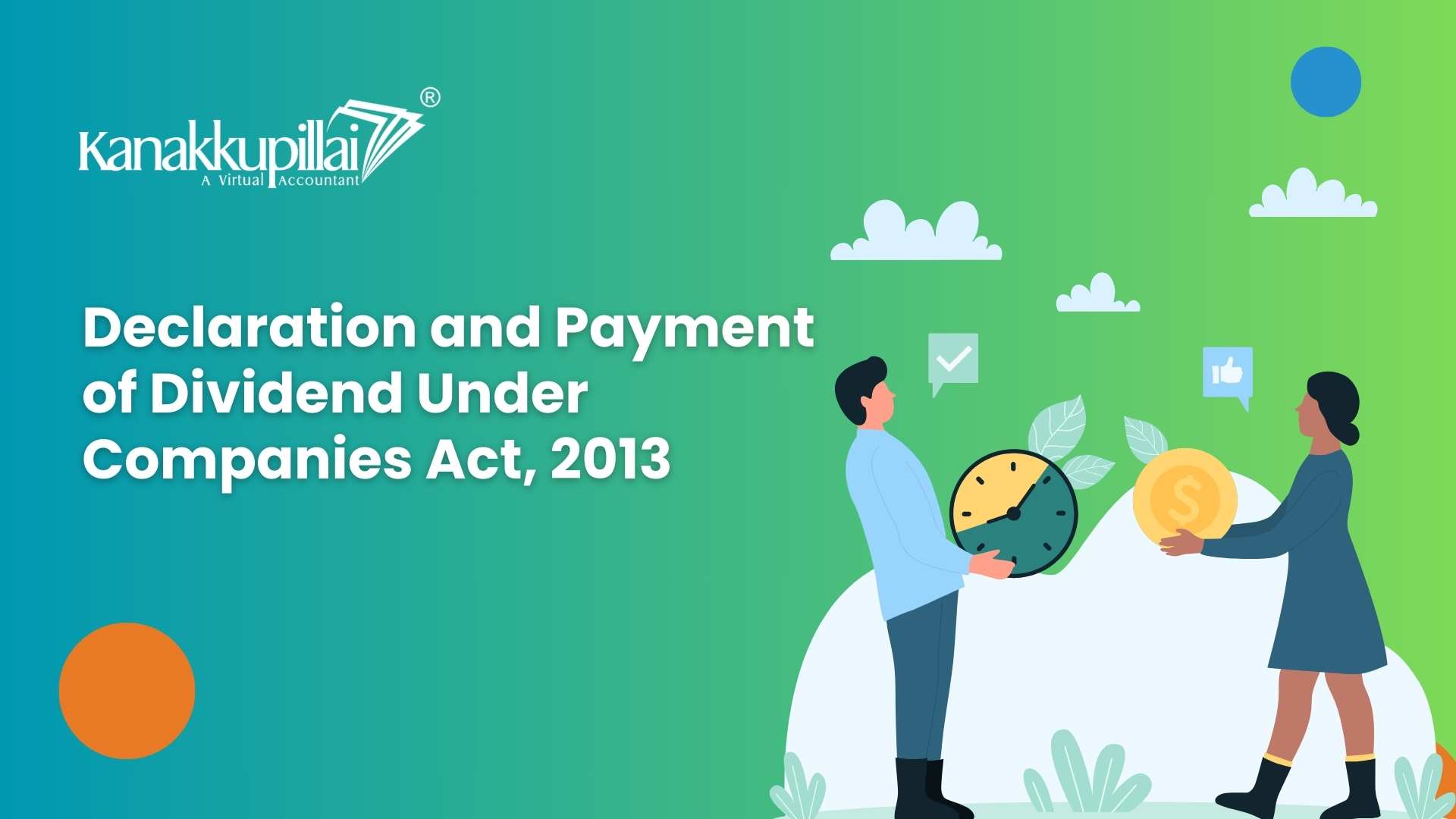Declaration and Payment of Dividends Under Companies Act, 2013

Profits allude to the particular income source for a company’s investors. It conveys a company’s income to its investors. The profit distribution to investors is covered by the Companies Act of 2013. The lawful system for profit instalments and investors’ freedoms, as well as certain limitations, are illustrated in these arrangements. From Section 123 to Section 127 of the Companies Act 2013, read with Companies (statement and instalment of profit) rule 2014.
Sources Of Funds
- Out of profit after providing depreciation,
- Out of Undistributed profit (Profits for any previous year after giving depreciation.)
- Out of the money supplied by the Central Government or State Government for the payment of dividend
→ Where deficiency or absence of benefits the company propose to declare a profit out of the free reserve, such statement of profit will be made as per Rule 3 of Companies (Declaration and payment of Dividend) Rule 2014
Rule 3 Of Companies (Declaration And Payment Of Dividend) Rule 2014 Conditions
- The dividend rate declared shall not exceed the average of the rates declared by it in the immediate three preceding financial years. This does not apply to a company that has not declared dividends in the last three immediately preceding years.
- The Total amount to be withdrawn from such accumulated profits shall be at most 1/10th of the sum of its paid-up share capital and free reserve in the latest audited financial statement.
- The remaining holdings after such withdrawal should stay within 15% of the paid-up share capital, according to the latest examined financial summary.
Organizations frequently pay out a portion of their profit out of income to the investors. Profit pay-outs are a method for giving investors a profit from their investments. The leading body of directors issues a declaration expressing how much will be paid out and over what period.
Dividend- Section 2(35)
“Dividend” includes any interim dividend;
Simply put, a dividend can be defined as the sum of money paid by a company to its shareholders out of the profits made by a company, if so authorized by its articles, in proportion to the amount paid- up on each share held by them. (Section 51)
Under the Companies Act 2013, Section 123 to 127 of Chapter VIII deals with the provisions related to the declaration and payment of dividends.
Interim Dividend- Section 123(3)
The Directorate of an organization might declare an interim dividend during any financial year or whenever during the period from the closure of the financial year till the holding of the yearly regular gathering, out of the profits made by the organization during such financial year or out of earlier year undistributed benefits (liable to Organisations (Statement and Instalment of Profit) Rules, 2014).
If the company has caused loss during the ongoing financial year up to the furthest limit of the quarter, quickly going before the date of the statement of break profit, such interim dividend profit will not be proclaimed at a rate higher than the typical profits announced by the organization during the previous three financial years.
The procedure of Declaration and Payment of Dividend
- Issue at least seven clear days’ notice of the meeting of the Board of Directors. (In the case of recorded companies, advise stock exchange(s) where the protections of the company are recorded somewhere around two working days ahead of the date of the gathering according to regulation 29 of SEBI (LODR) regulation, 2015) Hold a Board meeting and pass a resolution for recommending the final amount of the dividend.
- Listed companies must give at least seven days’ notice of Book closure to the stock exchange as per regulation 42 of SEBI (LODR) Regulations 2015.
- Close the register of members & the share transfer register of the company.
- Hold a Board/committee meeting to approve the registration of transfer/ transmission of the company’s shares, which have been lodged with the company before the commencement of book closure.
- The listed entity shall recommend or declare all dividends at least five working days before the record date fixed.
- Hold the annual general meeting (AGM) and pass an ordinary resolution declaring the dividend payment to the company’s shareholders as per the Board’s recommendation.
- Prepare a dividend statement concerning each shareholder and ensure the tax is paid to the tax authorities within the prescribed time.
- A Separate Bank Account must be opened, and the amount of dividend payable shall be credited to the account within five days of declaration.
- Any Reserve Bank of India-approved electronic mode of payment, such as Electronic Clearing Services (ECS), National Electronic Fund Transfer (NEFT), etc., must be used by the listed company for dividend payments, either directly or through its Registrars to Issue and Share Transfer Agent (RTI & STA).
- Given that it is unimaginable to expect to utilize the electronic instalment method, ‘payable-at-standard’ warrants or checks might be given. Yet, where the amount payable as profit surpasses 1,000 and 500 rupees, the ‘payable-at-standard’ warrants or checks will be sent by speed post (Regulation 12 of SEBI(LODR) Regulation 2015).
- If required, plan with the bank and collaborate with other banks to pay the Dividend Warrants at par.
- Dispatch dividend warrants are issued within 30 days of the dividend declaration. In the case of joint investors, dispatch the profit warrant to the primary named investor.
- The dividend must be transferred to an account called the “Unpaid Dividend Account” within seven days of the expiration of the period of 30 days from the declaration of the final dividend if it remains unpaid or unclaimed. (Section 124).
- Transfer unpaid dividend amount to shareholders Investor Education and Protection Fund (IEPF) after the expiry of a long time from the move date to unpaid profit A/c.
As Per Companies Act, 2013
- Within five days of the dividend’s declaration date, i.e., the company must deposit the dividend’s declared amount. 19.03.2020 (up to 23.03.2020)
- Further, the company should make the instalment around 30 days after the statement of the profit (up to 17.04.2020), failing which the company will be obligated to pay interest @18% p.a. for the time of default. Plus, depositing the unpaid benefit amount in the particular record in something like seven days from the termination of 30 days (for example, 23.04.2020) is expected.
Now, The Question is, Who Can Declare Dividends? Is it Applicable to all the Companies?
- Under the Companies Act 2013, Chapter VIII contains sections that deal with the arrangements connected with the statement and instalment of profits. Sections – 123 to 127 deal with the prerequisites relating to the statement and instalment of profits.
- Under the Companies Act 2013, Chapter VIII contains provisions regulating arrangements connected with the declaration and payment of dividends—sections- 123 to 127 arrangements with the arrangements associated with the announcement and instalment of profit.
Payment Of Dividend
- According to the Companies Act 2013 game plans, No benefit will be payable other than using money, where benefits payable in genuine cash can, in like manner, be paid through check, warrant or in any electronic mode to the financial backer who is equipped for the benefit.
- Condition: – A company that has committed any default in compliance with the provisions of sec- 73 and 74 relating to accepting and repaying deposits would be barred from declaring dividends.
Conclusion
Our article regarding the Declaration and Payment of Dividends under the Companies Act 2013 was informative and valuable, as it is provided in a simple way that can be understood. Also, we provide the information that meets your expectations, and experts offer all this information for your guidance to enhance the reputation—contact www.kanakkuppilai.com executives for further requirements.
Please Share This Share this content
- Opens in a new window
- Opens in a new window
- Opens in a new window
- Opens in a new window
G Durghasree B.A.B.L (Hons) is a registered trademark attorney with extensive experience as an Advocate for a period of 8 years. She possesses expertise in trademark law, including trademark filing and trademark hearings. Additionally, she is skilled in contract drafting and reviewing, providing legal advice and opinions, particularly in the areas of Company Law, Insolvency and Bankruptcy Code (IBC), and Goods and Service Tax Law (GST). Her experience encompasses both litigation and non-litigation aspects of these laws.
You Might Also Like


May 27, 2023

November 30, 2021
Recent Posts





